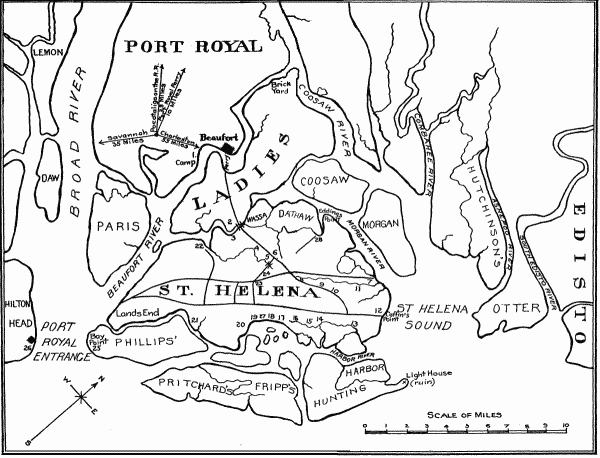March 24. 1864.

The effects of the Civil War affected agriculture and the slave population. Although the government promised to pay the workers for three months, the agents likely gave them some clothes in part payment.
March 24. Coffin’s Point.
It is the largest plantation on the Islands, with over 250 hands or slaves in its full days. Although a large amount of cotton was still in store, it awaited the arrival of a boat.
While planting corn, the cotton agents occupied two rooms in the William Fripp house for three or four months. On most of the plantations, enough corn remained to last until the next crop. However, the occupants were lacking molasses, sugar, salt, tobacco, and clothing.
Although two of the three plantations were doing well, Big Coffin was considered miserable and demoralized. Its former success in cotton had been due to the hands having worked very hard. Also, the workers were within several miles of Bay Point opposite Hilton Head. Hence, the temptation to leave was pressing. The cook received $30 monthly for cooking two or three messes but was sick. Meanwhile, the workers were talking about their freedom.
Known Plantations:
| Cherry Hill (T. A. Coffin) | 16 |
| Coffin’s Point (T. A. Coffin) | 12 |
| Corner (J. B. Fripp) | 5 |
| Eustis | 2 |
| Alvirah Fripp (Hope Place) | 18 |
| Edgar Fripp | 20 |
| Hamilton Fripp | 10 |
| J. B. Fripp (Corner) | 5 |
| Capt. John Fripp (Homestead) | 8 |
| Capt. Oliver Fripp | 22 |
| Thomas B. Fripp | 9 |
| Fripp Point | 11 |
| Frogmore (T. A. Coffin) | 19 |
| Rev. Robert Fuller (“R.’s”) | 4 |
| Hope Place (Alvirah Fripp) | 18 |
| Dr. Jenkins | 21 |
| Mary Jenkin | 28 |
| Martha E. McTureous | 14 |
| James McTureous | 15 |
| Mulberry Hill (John Fripp) | 17 |
| The Oaks (Pope) | 3 |
| Oakland | 6 |
| Pine Grove (Fripp) | 13 |
| Pope (The Oaks) | 3 |
| “R.’s” (Fuller) | 4 |
| Smith | 1 |
| Dr. White |
The following fragment of a letter, from which the date and the beginning are missing, was written from Pine Grove at about this time; its subject is the Farm Laborers.
“A large amount of cotton is still in store here, for which the boat, I hope, will call this week; meanwhile, the cotton agent and a guard occupy the house with us. The former has been on the place three or four months in charge of a large district with several plantations; he is a smart young fellow, very dashing and jockey-like. We were received by the guard with shouldered arms and by this agent, who did their best to induce or rather bluff us into leaving the premises and taking possession of another house, for we have two plantations besides this—estates belonging to William Fripp’s sons. We stayed, however, and are now occupying two rooms, with plenty of furniture of different kinds stored by the agent, probably for removal. The whole business of our Commission and all its agents are much disliked by the cotton agents, partly because they don’t sympathize with our purposes—partly because we seem about to usurp their authority, to which we do succeed.”
Source: Letters from Port Royal Written at the Time of the Civil War (1862-1858( by Elizabeth Ware Pearson (1906).